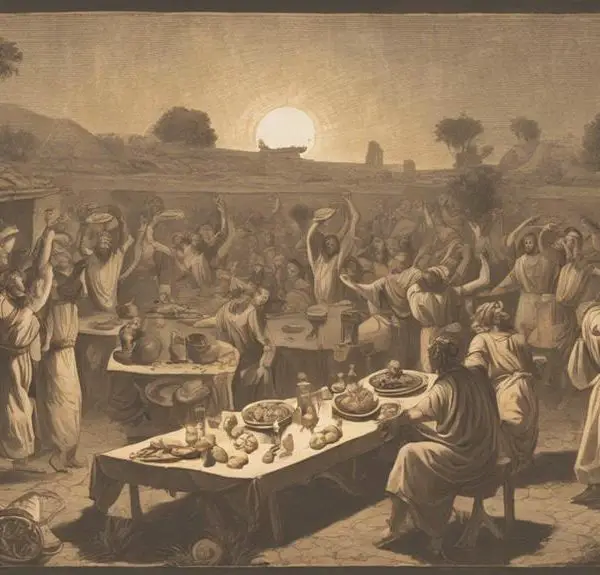Surety in the Bible goes beyond its contemporary meaning, offering a deeper understanding of biblical teachings – discover its profound implications today.

Define Surety in the Bible
Did you know the term 'surety' appears over 30 times in the King James Version of the Bible? It's a fascinating concept that has its roots in ancient customs.
You might find it intriguing that 'surety', in its biblical context, holds a much richer meaning than its modern interpretation. As you explore the biblical instances and interpretations of 'surety', you may uncover a profound understanding that could potentially transform your view on biblical teachings.
So, are you ready to embark on this enlightening journey?
Key Takeaways
- 'Surety' in the Bible signifies personal accountability, integrity, trust, and commitment to righteousness.
- Biblical instances of surety demonstrate personal sacrifice, God's grace, and human responsibility.
- In the Old Testament, surety signifies personal honor and societal duty, while in the New Testament, it is associated with Christ's guarantee.
- Contemporary interpretations of surety emphasize divine assurance, and encourage accountability and trustworthiness among Christians.
Understanding the Concept of 'Surety

To fully grasp the concept of 'surety', you must delve into its biblical context, understanding it as a guarantee or pledge often depicted in the form of a person who takes responsibility for another's debt or obligation. This goes beyond a mere financial arrangement. It's a commitment that demands personal accountability, demonstrating an unwavering sense of integrity and self-sacrifice. It's an embodiment of love and trust, where one willingly puts themselves at risk for the benefit of another.
'Surety symbolism', as found in the Bible, illuminates this concept further. The act of surety is often portrayed as a noble, virtuous deed, symbolizing an individual's commitment to uphold justice and righteousness, even at personal cost.
Delving into 'Surety's origin', it can be traced back to the ancient Hebraic laws, where the term 'surety' was interpreted as 'arab,' denoting a mix of being surety, a guarantor, and a pledge. It's a concept deeply ingrained in ancient societal norms, highlighting the value placed on trust, responsibility, and commitment. Understanding the concept of 'surety' in this light not only enriches your biblical knowledge but also offers unique insights into the ethical standards upheld by our ancestors.
Biblical Instances of 'Surety

While 'surety' is a recurring theme in the Bible, it's most notably exemplified in the stories of Judah and Philemon, where commitment, sacrifice, and personal accountability take center stage. Judah's promise to his father Jacob to bring back Benjamin from Egypt is a profound instance of 'surety'. He pledges his own life for his brother's safety, demonstrating the essence of surety as a personal commitment undertaken for the benefit of another.
In the New Testament, the apostle Paul's letter to Philemon offers another instance. Paul stands as a surety for Onesimus, a runaway slave, promising to repay any debts or obligations owed by Onesimus to Philemon. Here, surety illustrates personal accountability and responsibility, central themes in Paul's teachings.
Surety symbolism is also present in some parables. For instance, the Parable of the Unmerciful Servant (Matthew 18:21-35) uses the concept of surety to explore forgiveness and mercy. The servant's debt, which he can't pay back, symbolizes our moral debt to God. The king's forgiveness represents God's mercy. This parable demonstrates that 'surety' in the Bible often symbolizes a deeper spiritual truth about God's grace and human responsibility.
Surety' in Old Testament Context

Delving into the Old Testament's context, you'll find 'surety' plays a significant role in depicting promises, obligations, and personal accountability. This term, often associated with financial guarantees, takes on a broader, more nuanced meaning within the cultural context of surety in ancient Hebrew society.
Surety symbolism is prominent in the Old Testament, representing not just material or financial assurance, but also moral and spiritual commitments. In Proverbs 11:15, for instance, becoming surety for a stranger is cautioned against, implying a profound personal responsibility and risk involved in such a commitment.
In the cultural context, surety also signified a deep sense of personal honor and societal duty. It's interesting to note, however, that the Old Testament portrays surety not as an absolute virtue but as an act requiring discernment and wisdom. The wisdom literature, especially, presents it as potentially perilous, indicating a complex understanding of personal responsibility.
Surety' in New Testament Context

Moving from the Old Testament's rich tapestry of surety symbolism, you'll discover a fresh perspective in the New Testament, where 'surety' assumes a different but equally profound significance. In the New Testament, 'surety' is often associated with the concept of guarantee, particularly in relation to Jesus Christ's role as our guarantor before God.
In the New Testament, surety's theological significance is more pronounced. Here, 'surety' becomes a critical component of Christ's salvific work. Hebrews 7:22, for instance, refers to Jesus as the 'surety of a better covenant.' In this context, Christ serves as our surety, guaranteeing our salvation and eternal life before God.
Surety also figures in New Testament parables. Consider the Parable of the Unforgiving Servant in Matthew 18:23-35. Here, the servant's debt, once forgiven, is reinstated when he fails to show mercy to his fellow servant. The story underscores the surety of God's judgement if we don't show forgiveness to others.
Contemporary Interpretations of 'Surety

In today's world, the concept of 'surety' retains its relevance, often surfacing in theological discussions and scholarly interpretations of scripture. Contemporary readings of the Bible unearth a range of interpretations concerning 'surety', each presenting unique insights into its symbolism and ethical implications.
'Surety symbolism' is a concept often used to signify the promise of God's unwavering presence and protection. It's seen as a token of divine assurance, indicative of God's steadfast commitment to humanity.
'Surety's ethical implications', on the other hand, encourage an attitude of responsibility and accountability. Just as God pledges His constancy, so too are Christians urged to be reliable and trustworthy in their dealings.
Consider this table for a quick summary:
Concept |
Symbolism |
Ethical Implications |
|---|---|---|
Surety |
Divine assurance |
Responsibility and accountability |
As you explore the concept of 'surety' in your journey of faith, remember: it's not merely a theological term. It's a symbol of divine assurance and a call to ethical behavior. Whether you're interpreting ancient scriptures or dealing with daily challenges, the concept of 'surety' can offer deeper understanding and guidance.
Frequently Asked Questions
What Is the Original Hebrew or Greek Word for 'Surety' Used in the Bible?
You're asking about the original Hebrew or Greek word for 'surety' in the Bible.
In Hebrew, it's 'arab', often used in Prophetic Literature.
In Greek, it's 'engue'.
Both have implications on Biblical Covenants, acting as a pledge or guarantee.
Surety's application and influence is quite profound, shaping many narratives and teachings within the scripture.
Are There Any Contradictions in the Bible Pertaining to the Concept of 'Surety'?
You're asking if the Bible presents contradictions concerning 'surety'.
It's a complex subject, given surety's spiritual implications and the evolution of Biblical surety.
While some passages suggest caution with surety, others highlight it as a noble act.
This might seem contradictory, but it's often due to varying contexts.
Understanding these subtleties requires a deep study of the scriptures.
How Does the Concept of 'Surety' in the Bible Relate to Legal Terms Used in Modern Day Law?
You're exploring how Biblical 'surety' connects to modern legal terms. It's complex.
Biblical surety's historical context often involved a guarantee of debt repayment, similar to co-signing a loan today. Yet, surety's ethical implications in the Bible went deeper, intertwining with moral duty and personal responsibility.
Today's legal surety focuses mainly on financial obligation. So, the Biblical concept holds a broader, more personal scope than its modern counterpart.
Can the Concept of 'Surety' in the Bible Be Applied to Our Daily Life and if So, How?
Surety's spiritual implications in the Bible can indeed apply to your daily life. This Biblical concept influences how you form and handle relationships.
It teaches you to be someone's guarantee, standing in for them if needed. So, you'd not only be reliable, but also self-sacrificing. It's about going beyond your comfort zone for others' welfare.
Such an approach enriches your relationships, fostering trust and deep understanding.
Are There Any Notable Theologians or Biblical Scholars Who Have Written Extensively on the Concept of 'Surety'?
Yes, there are theologians who've studied 'Surety's Ethical Implications'.
For example, theologian John Calvin's writings explore the theological interpretations of surety. He discussed the concept's ethical implications and its impact on society.
It's important for you to delve into these works to gain more insight into the complex topic of surety in a theological context.
Conclusion
In wrapping up, you've navigated the biblical concept of 'surety', observed its presence in both the Old and New Testaments, and delved into contemporary interpretations.
It's clear that 'surety' holds significant implications for understanding biblical teachings, whether viewed as a promise, a pledge, or a guarantee.
Now, equipped with this knowledge, you're better prepared to delve deeper into your biblical studies and engage with the text in a more profound way.



Sign up